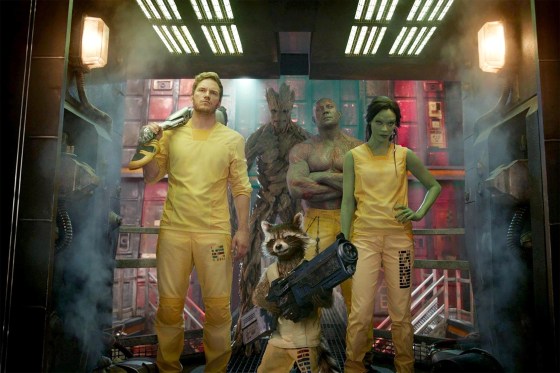Behind-the-scenes crew members in Hollywood have yet to reach a resolution with the industry's major film and television production companies over working conditions and pay — but many workers say the conditions they face have only got worse with the rise of streaming services and the pandemic.
NBC News spoke with three members of the International Association of Theatrical Stage Employees, or IATSE, about why they're ready to go on strike.
"If we don’t address this, I can't work in this industry till I'm 62, there's no way," said Gina Scarnati, 44, a specialty costume manufacturer who has worked in the industry for a decade. "We shouldn’t be begging for lunch breaks in 2021. I am 100 percent not financially prepared to go on strike, but we need to course correct. Right now, it's an industry I regret even getting into."
On Monday, more than 98 percent of the 60,000 workers in the union voted to authorize a strike if an agreement can't be reached with the Alliance of Motion Picture and Television Producers, or AMPTP, which represents the industry's production companies. It would be the first nationwide industry strike in the union's 128-year history. The union has received support from members of Congress, top Hollywood actors and directors and Hollywood's other unions.
Union members include camera operators, sound people, costume makers and hair and makeup artists. Their grievances include excessive working hours, insufficient downtime between shifts, unlivable wages, restrictions on pensions and missed meal breaks. Workers are also calling for an end to the labor discounts that have long been offered to "new media" productions.
The AMPTP did not respond to a request for comment. NBC News’ parent company, NBCUniversal, has production companies and studios that are AMPTP signatories.
Marisa Shipley, 33, an art department coordinator and the vice president of IATSE Local 871, said that the perception of the industry as all glamour only exacerbates the problem.
"There’s this presentation of the industry as a dream factory, not only that we’re producing these fantastical stories but also that working in the industry is a dream come true," she said. "People outside the industry say they would work on a set for free if given the opportunity, but this isn’t one day. This is day after day, hundreds of days, thousands of hours with these conditions and little pay."
Shipley said that a strike would affect the vast majority of the union crew working on three contracts, which affect projects in Hollywood, projects shot in other parts of the U.S., and talk and reality shows. That's a substantial portion of the U.S.-based work in television and film. Women, people of color, nonnative English speakers and those who identify as LGBTQ are also some of the hardest hit by poor industry conditions.
She said the pandemic has only made things worse because the downtime changed people's perspectives on work while also creating a crunch. Demand is at an all-time high in an industry that was already under strain because of the pressure to produce streaming content.
The breakneck pace at which streaming content is being rolled out is creating more work, but Scarnati said that because the people who can fill these roles are skilled laborers and demand far outweighs supply, it's making things worse for the available labor pool.
Scarnati, who's worked on franchises like "The Hunger Games," "Guardians of the Galaxy" and "Captain America" said she recently worked 21 days in a row where the shortest day was 12 hours, most days were 14, and the longest day was 19 hours.
The pace of production is something others in the industry feel as well. Keith Muessigmann, a manufacturing foreperson, told NBC News that the prep time for shows continues to get shorter and shorter but demands aren't being curbed to match.
"Expectations for TV shows to have a movie-quality look with a significantly smaller staff and timeline are unsustainable for the industry."
Muessigmann, 59, said that for a show he worked on before the pandemic he was fortunate to be paid his regular rate, but the expectation was that the show would have a movie-quality look with a significantly smaller staff size and timeline. He said this type of work environment is unsustainable for the industry.
"No one wants to be the person who doesn't deliver, but every time we do under these conditions, it pushes us in the wrong direction," Muessigmann said. "For me at my age, I can work another five to six years and I can get through it. But I’ve got two really young women working for me. I look at them and think if we don’t take the opportunity to get these issues resolved now, where are they going to be in 30 years?"
There's also the issue of the lower rates that certain streaming projects are allowed to pay even as this content generates millions for production companies. When streaming first debuted, some of the biggest companies, including Netflix, Amazon and Apple, were able to negotiate discounted rates — the idea being that these reduced rates would help bolster the emerging distribution method. Now streaming is thriving but workers are still being paid those lower rates. IATSE has proposed scrapping a provision that allows streamers with fewer than 20 million subscribers to offer discounted rates. Negotiations between IATSE and AMPTP had stalled but within days of the vote to authorize a strike, talks resumed and are currently ongoing.
"If you are sought after, you shouldn’t have to shoot yourself in the foot and take less money to work," Scarnati said. "It’s hard for me to understand, is it just insatiable greed, at the expense of us getting proper sleep and nutrition? If you discount somebody’s labor, you're discounting their life."
